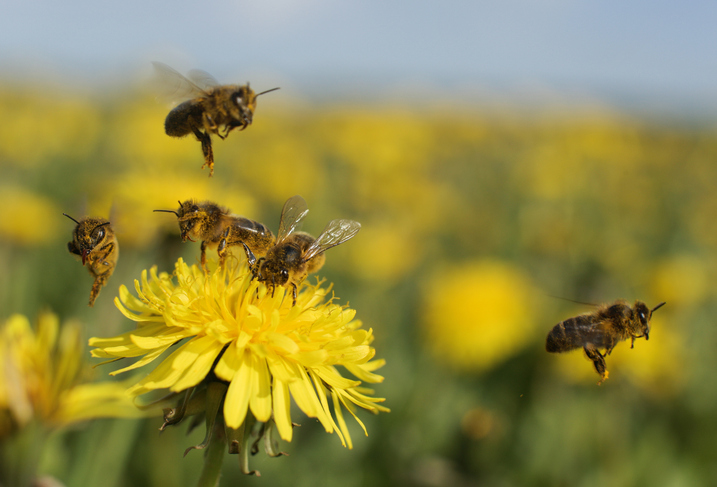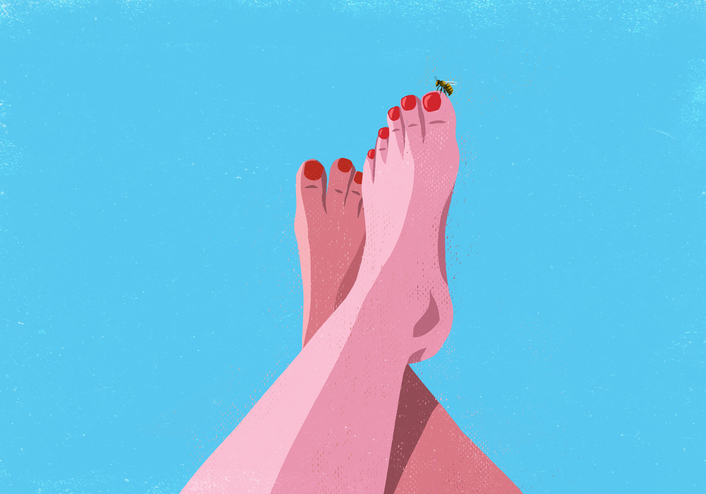Be Proactive About Bee Stings This Summer

By Joy Stephenson-Laws, J.D., Founder
A couple of weeks ago I was enjoying my favorite outdoor sport - golf. It was particularly hot, and I noticed a big rattlesnake just a few feet in front of us that was obstructing our path. Here is photo proof!
For many hikers, golfers and dog owners, coming across such a creature may be a big fear. But for me, honestly, I’m much more fearful of bees which are also present on hiking trails or the golf course. You may see why from the following story.
About a week or so ago in Austin, Texas, a woman and her dog were simply out for a walk in their neighborhood. Suddenly, they were caught in a swarm of hundreds of Africanized honey bees, according to one local news report.
The woman’s dog almost died, and she had to receive treatment at the emergency room.
“I was like swatting them away, I was trying to get them off of him. And then at one point he was just laying there and he was like, blanketed, like, like with these bees,” she said.

You may be more familiar with the term “killer bees,” which is what Africanized honey bees are. According to the news report mentioned earlier, they are “...a kind of honey bee not too different from the docile ones most of us are familiar with. Unlike your typical honey bee, though, Africanized honey bees are extremely aggressive and known to chase in swarms, covering and attacking people or animals in their wake.”
Apparently, Africanized honey bees have been present in Texas since the 1990s. They are triggered by loud noises, vibrations and if their hives are disturbed.
“During warmer weather, seemingly harmless activities like mowing the lawn can rile up a swarm.”
Along with Texas, Africanized honey bees are also found in Arizona, New Mexico and California (where I live).
Dexter, the dog in the story, is fortunately okay after suffering from acute liver failure due to the bee attack. His owner is also doing well after enduring 80 bee stings (half of them being on her face and scalp). She had a low grade fever and muscle pains from the stings.
“Any bee, whether it’s in a hive or wild colony or whatever, if you start messing with its hive, then it’s going to have problems, because I mean, that’s like somebody invading your home and messing with where you’re raising your kids and stuff like that,” said an entomologist, referenced in the news report.
Of course, none of us go out with the intention to trigger bees, but it can happen.And even if you live in an area of the U.S. where Africanized honey bees are not present, it does not mean that other types of bees are harmless (especially if you are allergic).
(Click here for a very helpful and informative article about 10 types of bees homeowners should know. I think everyone should be informed even if not a homeowner).
What is particularly concerning about bee stings is that many people don’t know they are allergic until they get stung. Furthermore, you may not react the same way every time you get stung. You could have a more severe reaction than prior stings.
“According to the American College of Allergy, Asthma & Immunology, about 5% of the population is allergic to insect stings. But most people aren't aware of their allergy until they're stung,” states this recent Medical Xpress report.
“Reactions to insect stings (wasps, bees, hornets) range in severity from minor to potentially fatal.”
If you have a more severe reaction, you could go into a state of anaphylaxis (which is a serious allergic reaction). (People with food allergies may experience anaphylaxis if they eat something they should not).
“Here's what happens when you're stung and have an allergic reaction: Your immune system produces immunoglobulin E, which reacts to the venom injected by the insect. This triggers your body's release of histamine and other chemicals that can cause severe responses,” according to the Medical Xpress report.
Some of these severe responses include itching and having hives throughout the body, swelling of the throat and tongue, trouble breathing, dizziness, nausea, stomach cramps and diarrhea and a steep decline in blood pressure that can lead to shock and a loss of consciousness.
People who know that they are allergic to bees or have food allergies may always keep an EpiPen on hand. EpiPens release an injection of epinephrine (also known as adrenaline). It is a hormone that helps open up the airways, raise blood pressure and reduce swelling.
I’m not suggesting that everyone walk around with an EpiPen, and I would highly advise speaking with your doctor about whether using one is personally safe for you. But there are steps we can take to be proactive when it comes to both preventing stings and treating them.
Preventing
- Right now is the season of outdoor parties and events. Be careful about leaving open sweet beverages out. Inspect your cup before drinking. Wide, open cups allow you to easily see if there is a bee present.
- Keep food and trash cans covered.
- Keep yards free of fallen fruit and animal feces. These can attract flies which attract wasps.
- Wearing closed-toe shoes is advised. Also avoid wearing bright colors and floral prints which can attract bees.
- This one is debatable to me, however, one Medical Xpress report suggests not wearing loose clothing because this can lead to a bee flying in between you and your clothes and getting trapped and stinging you. I get that, but who wants to wear tight clothes in the heat?! It’s really a personal decision and depends on your personal risk if you were to get stung.
- Drive with the windows rolled up.
- Be careful when mowing lawns and doing other activities that may trigger bees.
- Get professionals to remove hives and nests near your home.
- Do not swat at bees. This may cause them to sting. Stay calm and walk away.
Treating
- If you are stung, try to remove the stinger right away as to prevent venom from entering the body. You can use your fingernails or tweezers.
- Wash the area where you were stung with soap and water.
- If you notice redness, swelling or warmth around the sting, you can apply ice or a cold compress.
- You may also want to take an over-the-counter oral antihistamine. If you are on other medications, talk to your doctor to see if this will cause a drug interaction.
- Applying hydrocortisone cream or calamine lotion may also provide relief.
- Of course, if you have a very serious reaction or endure multiple stings like the woman in the story discussed earlier, seeking medical attention immediately is imperative.
In the event that you are attacked by a swarm, it is important to try to get into an enclosed space such as a vehicle or building. Some of the bees may follow, but this is better than being outside with more active bees. Honey bees can only sting once, so if you are in an enclosed space with a honey bee it can only sting you once. Africanized honey bees sting once and die, but some sources say they are known to chase people up to a quarter of a mile. They are an extremely aggressive bee so trying to outrun them may not be your best option!
In most cases, bee stings are harmless. But it never hurts to be prepared, proactive and aware. I know I will be during my next round of golf or hike - snakes or bees!
Enjoy your healthy life!
Disclaimer: This article is not intended to provide medical advice. Please consult with your doctor or another competent healthcare practitioner to get specific medical advice for your situation.
The pH professional health care team includes recognized experts from a variety of health care and related disciplines, including physicians, attorneys, nutritionists, nurses and certified fitness instructors. This team also includes the members of the pH Medical Advisory Board, which constantly monitors all pH programs, products and services. To learn more about the pH Medical Advisory Board, click here.







